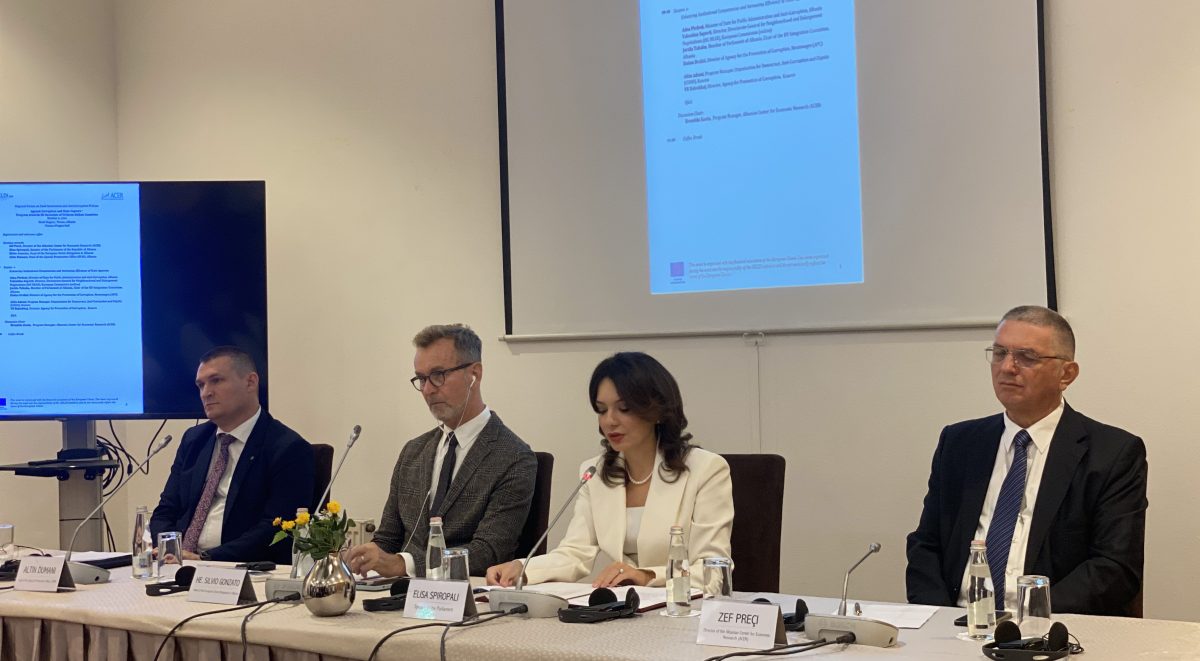
Tirana Policy Forum Conclusion: Countering Corruption and State Capture – Advancing EU Accession of Western Balkan Countries
On October 3, 2024, the Albanian Center for Economic Research (ACER), in collaboration with the Southeast European Leadership for Development and Integrity (SELDI) network, organized the Forum on Good Governance and Anti-Corruption Policies. This forum aimed to strengthen cooperation between civil society organizations, the business community, and law enforcement agencies in the Western Balkans, focusing on the fight against corruption as a means to accelerate the region’s European integration.
The event brought together prominent leaders and activists from civil society organizations, members of parliament, public policy developers, representatives from donor institutions like the EU, law enforcement agencies, and the media. They shared perspectives on the challenges and successes in promoting good governance and combating corruption.
Opening Remarks:
- Zef Preçi, Director of ACER, emphasized the role of cooperation between civil society, business, and law enforcement to combat corruption, which hinders rule of law, economic development, and EU integration. He underscored the importance of SELDI’s regional initiatives to counter corruption and highlighted the need for political will and institutional support to drive change.
- Elisa Spiropali, Speaker of the Albanian Parliament, stressed that corruption is a significant threat and outlined new legislative measures aimed at preventing corruption and promoting accountability. She called for collaboration between political actors and civil society in advancing anti-corruption reforms.
- Silvio Gonzato, Head of the EU Delegation to Albania, discussed the need for targeted anti-corruption efforts in high-risk sectors like taxation, customs, and public procurement. He reiterated the EU’s commitment to supporting Albania with strategic and financial assistance in its anti-corruption efforts.
Session Highlights:
- Enhancing Institutional Competencies and Efficiency of State Agencies:
- Speakers from Albania, Kosovo, and Montenegro discussed legal frameworks and mechanisms for fighting corruption. The focus was on improving the capacity of state agencies and ensuring the independence of anti-corruption structures, with successful examples from across the region.
- Engagement of Civil Society in Mobilizing Citizens Using Modern Tools Against Corruption:
- This session emphasized the importance of civil society in mobilizing citizens and raising awareness. Tools like corruption monitoring systems were presented, and the role of NGOs in fostering transparency was highlighted. Speakers also addressed the significant challenge of political corruption in the region.
- Building Public Trust in Law Enforcement Agencies:
- The final session focused on strategies to build public trust in law enforcement institutions. Representatives from the OSCE and other organizations discussed the need for political will and transparency to ensure effective anti-corruption measures. The role of public procurement oversight and the importance of civil society’s involvement were underscored.
The forum concluded with calls for continued collaboration between civil society, media, and business sectors in addressing corruption. Panelists highlighted the draft Albanian Intersectoral Anti-Corruption Strategy 2024-2030, which includes measures such as corruption risk assessments, increased digitalization of public services, and enhanced civil society participation in the legislative process.
This forum reinforced the critical role of regional cooperation in the fight against corruption and in advancing the EU integration process for the Western Balkans.
Presentations during the event:
Zdravko Veljanov’s Presentation
Daniel Kaufmann’s Video Message
Concept Note and Agenda:
Tirana’s Policy Forum Concept Note and Agenda
Minutes of the Forum:
Event Photos:











